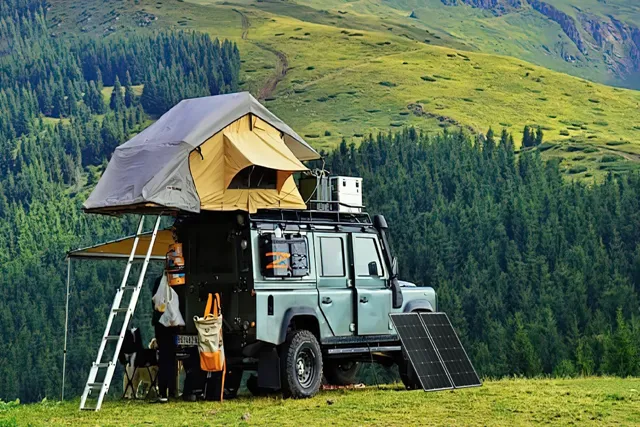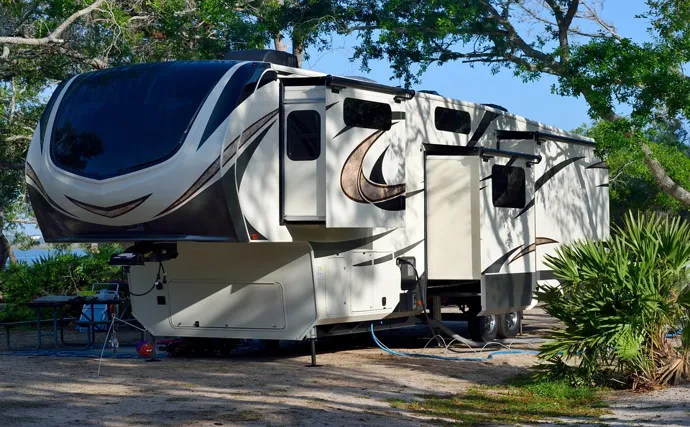Taking a picturesque journey through North America in a campervan or RV is an experience like no other. However, to ensure that your adventure goes uninterrupted, especially when it comes to powering your gadgets, appliances and essential equipment, choosing the right inverter for camper is crucial.

Learn about inverter for camper
The inverter is a key component in your campervan’s electrical setup, converting DC power from the battery into AC power, allowing you to use your home appliances and electronics. Electrical outlets in your RV require a specific type of power source to operate – usually shore power or a generator to work. However, an RV inverter is a device that can run these outlets without a generator or shore power, rather than using the vehicle’s battery as an energy source.
Overall, an inverter is an excellent choice for those who want minimal outlet use while camping away from a connection and without using a generator. They do require some adjustments to the 120v power system, but an RV inverter may help.

Type of inverter
Campervan power inverter: specially designed to meet the needs of campervan life, providing AC power for electrical appliances and electronic products. Sine Wave – These types of inverters have a strong presence in the market as they allow most types of devices to run on them, including high-power devices such as microwave ovens.
12V Inverters for Campervans: Ideal for small electronics, these inverters connect directly to your campervan’s 12V battery, providing convenience and efficiency.
Campervan Power Inverter and inverter for camper: Generally refers to any inverter in a campervan that is used to convert DC power to AC power, but they can only run simple AC appliances covering a range of power capacities to suit a variety of needs .
Choose the best power inverter for camping
Choosing the best inverter requires understanding your power requirements, the types of appliances you plan to run, and ensuring compatibility with your campervan’s electrical system. Here are some factors to consider:
Just like anything else you buy for your RV, you want the right inverter to best meet your needs. When narrowing down your choices, be sure to consider these factors.
Wattage and power rating
If you want anything to run with an inverter, you need to have the right power capacity to make this happen. Inverters deal with energy in every aspect, from maximum energy output level, regular power operation, to overall power rating. In order to accurately pick out a product that can support your AC appliances during an outage, you should first understand how much power you need.
Input and output voltage
In order for everything to run the way you want it, it’s crucial to have the proper input and output voltages. The input voltage should match your RV battery, many RVs use 12V batteries so your inverter should be rated for 12V DC. Output Voltage Power Supply for most US, CaJ.D., Mexican RVs require 120V AC power (other locations and equipment will use different energy sources).
energy efficiency
Even though an RV inverter can operate at a level that suits your needs, you don’t want to overlook its efficiency. The higher the efficiency of the inverter, the better it will operate. Otherwise, the inverter could put a huge strain on your RV, increasing the amount of energy you consume.
Installation and maintenance
Correct installation is key to the safe and efficient operation of the inverter. It is recommended to have the inverter installed by a professional to ensure it is properly integrated into the campervan’s electrical system. Regular maintenance, including cleaning and inspection, will extend the life of your inverter.

inverter for camper FAQs
How does an inverter for camper work?
inverter for camper inverter acts as a type of converter. Since they supply power to the electrical outlet from the RV’s battery, the inverter’s job is to make the power types compatible between the two. Batteries run on DC power, which is different from the AC current that most appliances run on. The inverter ensures that the equipment can operate safely in this other power state.
What should you pay attention to when buying an inverter for camper?
There are a few key factors to consider when choosing the right inverter size (power capacity) for your RV. The main function of the inverter is to convert direct current (DC) into alternating current (AC) to supply devices that require AC power to operate. Here are a few steps for deciding on inverter size:
List all the devices that need to be powered by the inverter: First, list all the AC devices you plan to use in your RV, such as refrigerators, microwaves, TVs, computers, etc.
Calculate total power requirements: Look at the label or instructions for each device to find their power requirements, usually expressed in watts (W). Add the power requirements of all devices to get the total power requirement.
How many solar panel combinations do you need?
Calculating the number of solar panels needed involves considering several key factors, including daily power demand, solar panel efficiency, available sunlight hours, and the overall efficiency of the system.
Use the following formula to estimate the number of solar panels you need:
Number of Solar Panels Required=Daily Energy Requirement (Wh/day)Panel Power Output (W)×Average Sunlight Hours (hours/day)×System EfficiencyNumber of Solar Panels Required=Panel Power Output (W)×Average Sunlight Hours (hours/day)×System EfficiencyDaily Energy Requirement (Wh/day)
Example
Assuming your daily energy requirement is 5000Wh, the average sunlight hours in your location are 5 hours per day, the solar panels you plan to use have a power output of 300W, and you assume a system efficiency of 80% (or 0.8):
- Daily Energy Requirement: 5000Wh
- Average Sunlight Hours: 5 hours
- Panel Power Output: 300W
- System Efficiency: 0.8
Plugging these values into the formula:
Number of Solar Panels Required=5000/300×5×0.8≈4.17Number of Solar Panels Required=300×5×0.85000≈4.17
Therefore, you would need approximately 5 solar panels (rounding up) to meet your daily energy requirements.
What are the causes of inverter for camper failure?
inverter for camper failures are commonly caused by improper installation, often due to not following the user manual’s recommendations or choosing unsuitable cables and fuses. Beyond installation issues, capacitor wear, overuse, voltage spikes, and the loosening or corrosion of electrical connections also contribute to failures. Regular maintenance, including capacitor replacement and connection checks, is crucial to prevent these problems and extend the inverter’s lifespan.
In conclusion
Inverters are an indispensable tool to enhance your camping and RVing experience in North America. By choosing the right inverter for your camper van, you can ensure that your power needs are met efficiently and safely. Remember to consider your power needs, choose the right inverter type, and prioritize safety features to make the most of your adventure.











